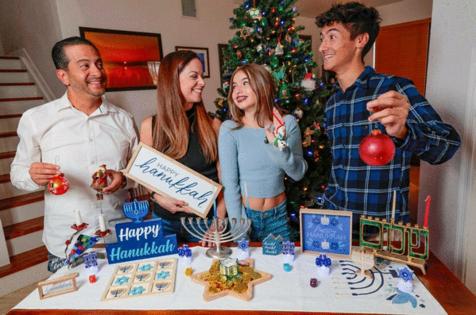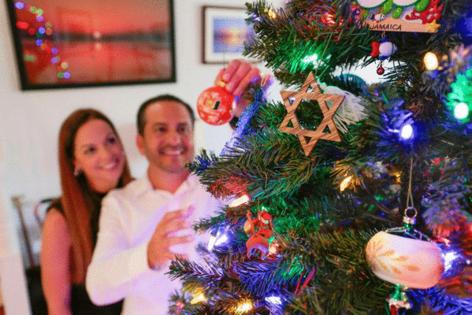Merry Christmas and Happy Hanukkah! Rare holiday overlap sparks reflection on faith
Published in News & Features
MIAMI — For the first time in nearly 20 years, the first night of Hanukkah falls on Christmas Day, marking a rare confluence of Jewish and Christian holidays, which occur on separate calendars.
Many regions of the country are home to a variety of faith groups, with rich traditions and cultures. In South Florida, for instance, though there are significantly more Christians, including Catholics, the area hosts the third largest Jewish population in the country. And this year’s convergence of Christmas and Hanukkah, faith leaders say, is an opportunity to foster interfaith relationships through the holidays’ shared themes of hope and light.
The Rev. Priscilla Felisky Whitehead said holiday gatherings are a perfect setting for people to learn about each other’s traditions.
“It’s an opportunity to really hear people’s stories and to take the time … to listen to people’s backgrounds and how important their faith communities, their families have been, and how they look at the world,” said Whitehead, who was a pastor at The Church by the Sea in Bal Harbour for 22 years.
The holidays, Whitehead said, allow people to set aside their politics and “engage other human beings, at the place where their lives are touched the most by friends, family, tradition and faith.”
For many faith leaders in South Florida, building relationships with people of other religious backgrounds is an important factor to building a stronger community. Interfaith work, which has roots to the 1930s in Miami, is often touted as a way to build bridges and find common ground in the face of prejudice and fear of “the other.”
But, as prominent North Miami Rabbi Ralph Kingsley points out, interfaith dialogue is also about recognizing people’s differences.
“The thing that makes us most alike as human beings is the fact that we are different and have a right to our own differences, at the same time being respectful of the other to have a right to his or her own way of life,” Kingsley said. “And I think both of our traditions try to project that message at this particular season.”
Kingsley, 91, who served as the rabbi of Temple Sinai of North Dade for more than 30 years, remembers the ongoing battles of separation of church and state in his youth. He admits that he was adamant about not celebrating religious events in public spaces. But, today, he feels differently.
“I kind of have come to appreciate the fact that today, when there was a Christmas tree on display or a creche, there’s also a menorah, and Americans have been sort of taught over the years that they’ve got to live with both side by side and appreciate the fact that there is the other.”
Whitehead and Kingsley are long-time friends, partly because of their work in South Florida interfaith circles. They were reunited, unexpectedly, when they both became residents at the senior living community Vi at Aventura.
Different holidays, same roots
Jews and Christians already have a lot in common, as both come from Abrahamic religions, meaning they (along with Muslims) share the belief that Abraham was the initial prophet with whom God made a covenant.
“Both traditions were birthed together in these ancient stories, and they kind of take a turn from each other, but … our roots really are very much the same,” said Hafner of the Coral Gables Congregational United Church of Christ.
“We understand Jesus as being Jewish, and the early Christians came out of that Jewish tradition, so they would have understood Passover, they would have understood Hanukkah and a lot of the other traditions.”
Christmas and Hanukkah, though originating from very different stories, have some shared themes: they’re both, in a way, celebrations of light and hope during the darkest time of the year.
“It’s a time for both of our faith traditions to emphasize the importance of light and hope, which the winter months increasingly, not so much in Florida, but up North, certainly, become a time of darkness,” Rabbi Kingsley said.
Both holidays, Rabbi Kingsley noted, are not really based on the Bible itself, but are holidays occurring in post-biblical times.
Though the Bible refers — in many places — to the birth of Jesus Christ to the Virgin Mary, the exact date of Jesus’ birth is not recorded in the Bible, nor is the celebration of Christmas. And Jews learn about Hanukkah from the Apocrypha, Jewish writings that are not included in the Hebrew Bible.
Similarly, the origin of Hanukkah is based on a real historical event that took place during a tumultuous time for Jewish people.
Hanukkah commemorates the victory of the Jewish people over the Syrian army in a fight to gain religious freedom. When the Syrians were trying to impose their religion and culture on the Jewish people, the non-conformist army, the Maccabees, were able to fight and win the rededication of their temple in Jerusalem.
“When they went to rekindle the eternal light in the ancient temple in Jerusalem, they only had enough oil to last for one night, and it lasted for eight — hence the miracle of that season,” said Kingsley. “But the great miracle is the fact that this small group of Maccabees could defeat this large Syrian empire.”
The way Kingsley sees it, that victory by the Maccabees ultimately led to the origin of Christmas.
“Were it not for that victory, there would have been no Christmas, because there would have been no Judaism, out of which Christianity ultimately was born, so it’s an interesting twist of history.”
Interfaith family celebrations
For some families, the merging of two religions is an everyday occurrence. Miami native Sarah Robleto is Jewish while her husband, Frank Robleto, who was born in Nicaragua, grew up Catholic. When they were married, they had two weddings. And now, every year the family of four celebrates both Christmas and Hanukkah, integrating family traditions from both religions.
“We definitely do both. And this year, it’s kind of even more special because the first night [of Hanukkah] is on Christmas night,” Sarah said. She added an important caveat: the children do not get “double the gifts.”
The Robleto’s two children — Jacob, 19, and Madelyne, 13, were both raised Jewish — a decision their parents made early on in their discussion on how to merge their two faith backgrounds.
“My biggest concern is that our kids were raised in a religion,” said Frank. “Whether it was Judaism or Catholicism, I didn’t mind either way. I was happy to have them being raised Jewish.”
The Robletos, who live in Cutler Bay, currently attend Temple Judea, a Reform synagogue in Coral Gables and on some Catholic holidays, Saint Louis Catholic Church in Pinecrest. Frank, who is still a practicing Catholic, said attending service that’s different from what he’s used to has been made easier by the rabbis and welcoming atmosphere at the synagogues his family has been a part of.
“It’s all about how open the temple or the church is on inviting mixed faith marriages. Luckily for us, because we’ve been, or Sarah’s mostly been at Reform temples, they’ve had that openness to invite me as well.”
This year, the Robletos will be in Georgia visiting extended family for Christmas. But, Sarah plans to host a Hanukkah night to give her nieces and nephews a true Hanukkah experience.
Rev. Laurinda Hafner, who is known in the community for her ability to use her faith to fight social justice causes, said interfaith work is also about working together towards a common goal. Her congregation has hosted events against the issue of book banning in schools and panels to discuss Christian Nationalism, a topic she calls a “common concern” among many faith leaders. She also says, interfaith work is most effective when people can sit down, share a meal and talk.
“I am convinced that when you sit down with other people around the table and you enjoy a meal together, break bread, or have a glass of wine, that’s where the real interfaith dialogue and the real interfaith work begins,” Hafner said.
_______
©2024 Miami Herald. Visit miamiherald.com. Distributed by Tribune Content Agency, LLC.










Comments